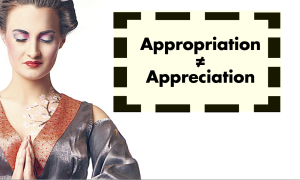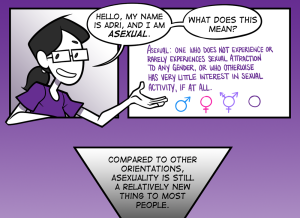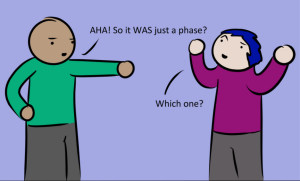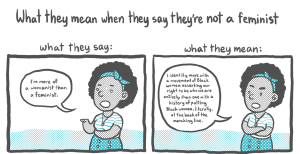
A gamer who’s just won pumps their fist in celebration.
(Content notice: rape, mention of being drugged)
Even though we often think of rape culture as being perpetuated by direct actions – like grabbing someone without their permission, pushing too far in a sexual situation, or insisting that a non-consensual act was totally consensual – we don’t always think about how our casual, everyday language plays into it.
It wasn’t until I was joking around with some friends and someone said, “I thought he was going to rape me,” in a lighthearted tone that I realized our words contribute to rape culture, too.
As a rape and sexual assault survivor, I felt uncomfortable. Was it supposed to be funny that my friend had unwanted romantic and sexual advances? Obviously, the trauma of being raped is never actually funny.
My friends and I consider ourselves feminists, but I felt awkward. How should I react?
I forced a laugh, but it felt insincere not to talk about the way this seemingly insignificant exchange plays into rape culture.
While my friends consider actual rape jokes taboo and are generally cautious of our language to actively fight against sexism and other forms of systemic oppression, for some reason, we hadn’t really talked about some of the most common, casual phrases that carry the weight of sexual violence and rape culture.
As activists, we need to investigate the language we use (especially when it contributes to systemic oppression) and actively work to use language that empowers people (especially marginalized folks) and advocates for enthusiastic consent.
Here are a few everyday examples of language that supports rape culture that we should all remove from our vocabulary.
1. ‘Fuck You’ and ‘Suck My Dick’
Any language that associates sexual violence with anger promotes rape culture.
Phrases like this, which are usually used when we’re angry at or disagree with someone, send the message that it’s okay to force sexual violence on them.
It’s not okay to spreading the idea that someone deserves sexual violence if they anger us enough.
2. ‘I Just Raped That (Noun)’
When you use the word “rape” as a stand-in for “winning,” it not only de-legitimizes actual rape (which is a crime and can be an extremely traumatic experience for survivors), but it also equates sexual violence with being victorious.
If you use it in the opposite context – “That game raped me!” and the like – it makes light of rape and insinuates that the perpetrator (the game) was victorious because it committed sexual violence against you.
Both of these examples make it seem like sexual violence is a positive outcome for the perpetrator.
When survivors hear language like this, we know to be on guard. It may seem like a harmless mention, but it could be triggering and it absolutely downplays the seriousness of rape.
3. ‘Boys Will Be Boys’
This one might seem more tied to sexism and patriarchy, but if we look closely, we also see that it contributes to rape culture.
When we say things like “Boys will be boys,” or anything that dismisses problematic behavior (usually by cisgender men), we’re reinforcing the idea that if boys commit sexual violence or act against someone’s consent, they won’t be punished.
4. ‘She’s a Slut/Whore’ and ‘What Is She Wearing?’ (Among Other Examples of Sex-Shaming)
As well as contributing to sexism and sex-shaming (also commonly known as “slut-shaming”), these phrases serve to place the blame entirely on women and femmes for the way they’re dressed – and consequently, for anything that happens to them.
These are commonly used in victim-blaming after a rape or sexual assault, to suggest that the survivor deserved what happened to them because their clothes were “asking for it.”
5. ‘They Friendzoned Me!’
First of all, the “friend zone” isn’t a real thing, and it’s also a concept that’s based entirely in rape culture.
The “friend zone” assumes that because a person (usually a man or masculine, but not always) asks to be romantic or sexual with someone (usually a woman or femme), they should be able to – and that if the person being pursued suggests they just be friends instead of dating or having sex, they’re “friendzoning” the asker.
This one’s extremely common in media portrayals, to the point where we often reward the person who is being “friendzoned” by sympathizing and hoping the other person will change their mind.
If someone doesn’t want a romantic or sexual relationship, that’s completely fine, and we shouldn’t invalidate that consent by saying things like, “But he’s such a Nice Guy! Why won’t you go out with him?”
6. All Rape Jokes
Unsurprisingly, any joke that uses rape as a punchline or a “gotcha” is built on the back of rape culture.
Rape is a serious act of violence and not something to be joked about, especially because these jokes can be triggering for survivors.
While I’m lucky that people in my close circle don’t typically make rape jokes, I still hear them on a regular basis in movies, on TV, at comedy shows, and when I’m out in public.
As a survivor, even a small rape joke can remind me of the traumatic experience – especially if the joke has anything to do with the victim being immobile, drugged, or unconscious, since that’s what happened to me – and send me into an episode of PTSD.
Even if you’re not at all concerned that a survivor is nearby (and you should be, based on the high statistics of how many people are survivors) rape jokes depend on rape culture to be “funny.”
You’re essentially finding humor in the idea of taking away someone’s consent – and that’s not okay, full stop.
7. ‘That Person Is Going to Rape and/or Drug Me’
This is an example of everyday rape culture language that I can admit to having used and subsequently eliminated from my vocabulary. I remember saying this before I was sexually assaulted, and becoming starkly aware of it every time this type of language came up in casual conversation afterward.
Generally, these phrases are associated with unwanted romantic and sexual advances from others, which makes them even more sinister beneath the surface.
I’ve heard friends say things like this when they’re dealing with unwanted attention, but they (usually) don’t actually mean they’re afraid of literal sexual violence from the person they’re talking about.
In these instances, rape is conflated to a humorous end result of an unwanted advance.
In some ways, we may use these jokes because we recognize on some level that unwanted advances can turn into sexual violence quickly and that not every potential sexual partner will retain our enthusiastic consent.
But when we say these things, we’re delegitimizing actual sexual violence and making it harder for people to speak up when their consent is violated.
8. ‘I Know You Want It’
Usually used in romantic and sexual settings, but also sometimes as a joke among friends, “I know you want it” implies that someone’s enthusiastic affirmative consent doesn’t matter because you can “just tell” that they’re consenting.
This takes consent away from the person it’s being said about and places the power in the hands of the speaker.
Consent includes verbal and non-verbal communication. We shouldn’t normalize the false idea that you can “just tell” if someone consents when they haven’t communicated that they want to have sex.
9. ‘Why Don’t You Want Me?’
This phrase – or any language that shames someone for not giving their consent or pressures them into saying yes so that they won’t hurt the speaker’s feelings – supports rape culture.
Usually, the phrase “Why don’t you want me?” is associated with fear on the speaker’s behalf: fear that because enthusiastic consent for sex isn’t given, that person is completely uninterested sexually.
This assumes that if someone doesn’t want sex at any given moment – whether it’s because they fall on the asexual spectrum, they aren’t feeling well, or they’re just plain busy – they don’t value the person they’ve turned down. It associates sex with liking or loving someone, and that’s not okay.
Being rejected by a potential sexual partner may not feel awesome. It might hurt.
But this is a great time to find a healthier way to deal with rejection, instead of using it as an excuse to feel entitled to sex and shame the person who isn’t interested.
The phrase and similar iterations are so embedded into our cultural view of relationships that, even within consensual and feminist relationships, it can be hard to get rid of the idea that consenting to sex = valuing a person, while not consenting = not valuing them.
10. All Examples of Catcalling
Catcalling upholds the idea that women and femmes are objects to be desired and that catcallers have the right to objectify them.
So many people dismiss catcalling as a “compliment.”
The idea that catcalling is harmless – or even a positive experience – shows that rape culture expects masculine folks to do or say whatever they want regarding femme folks’ bodies without consequence.
When we say that catcalling is harmless, we’re actually reinforcing rape culture, because we’re silencing women and femmes after they experience sexual harassment.
11. ‘You’re a Tease’
Just like the above forms of sex-shaming, implying that someone’s a tease contributes to rape culture – because it implies that they “should” be making themselves available for sex.
Consent for sex can be taken away or amended at any time, regardless of previous consent or a sustained sexual relationship. There’s absolutely nothing wrong with someone if they change their mind.
12. ‘I’ll Convince You’
Any language that implies someone can be convinced or coerced into sex or romance reinforces the idea that we don’t own our enthusiastic consent and that our consent is not truly ours – that it can be “won” by a convincing party at any time.
13. ‘Give Me a Hug’ (Or Any Language Implying That You’re Obligated to Touch Someone)
This is most often used in familial settings, and most of us have probably heard it before – especially from older relatives who insist that it’s rude if we don’t give physical affection on demand.
Any language that implies someone has to touch anyone else without their consent – sexual or otherwise – plays into rape culture. Even though it may seem harmless (after all, what’s wrong with giving your grandma a kiss on the cheek at a family party?), it teaches us from a young age that our bodies and our consent are not our own.
We learn that saying no is rude – so if we don’t feel comfortable touching someone, we’d better get over it.
But different kids have different boundaries, and it’s not okay to assume that their only reason for saying no (or for setting boundaries, period) is a lack of manners.
It may also unintentionally teach kids that sexual violence against them is okay.
If they’re being forced to hug a relative at the holidays, they may not know the difference if they’re later the victim of sexual abuse, or they may not have the language to speak up about it.
14. ‘I Scored’ or ‘I Got It In’
Language that’s used when a person (typically a cisgender man because of the gender role he’s socialized to fit, but not always) “convinces” someone into sexual activity plays into the idea that consent is something that can be won.
This is a claim that even if sex was gained through some kind of convincing, manipulation, or coercion – which are examples of sexual violence, even though many people don’t realize it– it’s a positive outcome.
These phrases also objectify the person that the speaker had sex with, turning them and their body into a prize that’s up for the taking or a game to be won.
***
Even though we may think of sexual violence as an immediate concern, our language says a lot about us – and about how our society upholds rape culture and systemic oppression.
When we use language that supports rape culture, we’re not working to actively dismantle it and we’re not supporting survivors of sexual violence.
Language is so deeply embedded into our culture that sometimes we don’t even notice we’re doing this.
When I was sexually assaulted for the first time, I thought about some of these common instances of insidious language. My assailant was a friend who acted like they had a right to my body and my affection, and who pulled the “friendzone” card and used my no to garner guilt about the rejection they felt.
For years after, I didn’t even realize I had been assaulted because rape culture is so deeply embedded into our culture and language that I couldn’t tell the difference between that experience and a consensual one.
Treating sexual violence as something that isn’t a big deal or is in some way the survivor’s fault makes it even harder for survivors to be believed, to receive adequate support for healing, to get any resolution on a legal level (though, of course, incarceration alone will not stop rape), or to even realize that what happened to them isn’t their fault.
It’s no wonder survivors deal with of all this when we’re normalizing sexual violence in our everyday language.
Until we work to understand why these phrases are problematic and why they contribute to rape culture – and then work to eliminate them from our vocabulary – we’re contributing to the same system that takes away our right to enthusiastically consent.
[do_widget id=’text-101′]
Alaina Leary is a Contributing Writer for Everyday Feminism. She is a Bostonian currently studying for her MA in publishing at Emerson College. She’s a disabled, queer activist and is on the social media team at We Need Diverse Books. She can often be found re-reading her favorite books and covering everything in glitter. You can find her at her website or on Instagram and Twitter @alainaskeys. Read her articles here.
Search our 3000+ articles!
Read our articles about:
Our online racial justice training
Used by hundreds of universities, non-profits, and businesses.
Click to learn more
Most Read Articles
- « Previous
- 1
- …
- 30
- 31
- 32



















